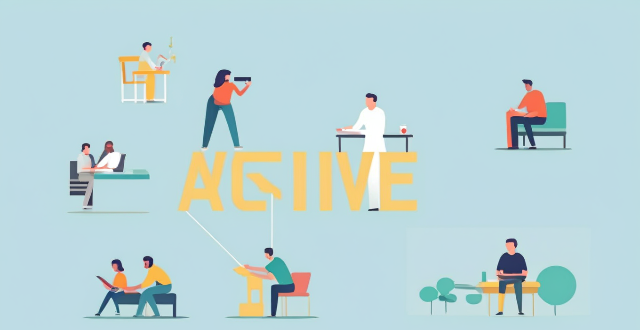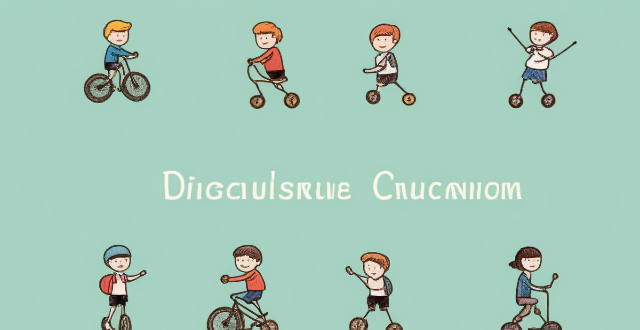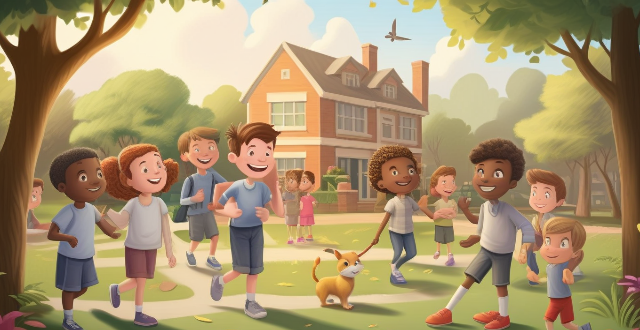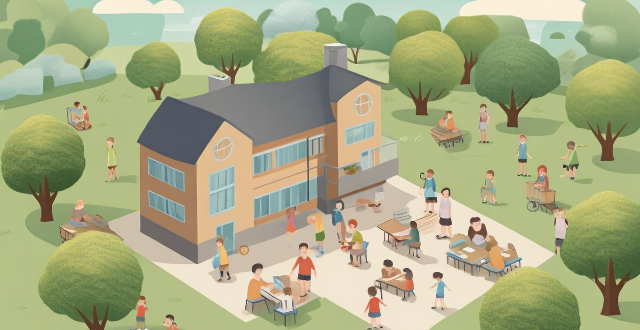Skill Extracurricular

How do extracurricular activities contribute to the development of student leaders ?
**The Role of Extracurricular Activities in Nurturing Student Leaders** **Skill Development:** Extracurricular activities offer a platform for students to acquire and refine various skills, such as communication, teamwork, time management, and problem-solving. **Confidence Building:** Involvement in extracurricular activities often leads to increased self-assurance through taking initiative and overcoming challenges. **Interpersonal Abilities:** Engaging in extracurricular activities fosters key interpersonal abilities like networking, empathy, emotional intelligence, and influence. **Real-World Experience:** Extracurricular activities simulate real-world experiences where leadership is crucial, teaching organizational skills and adaptability. **Responsibility and Commitment:** Participation teaches responsibility and commitment through accountability and dedication to practice or training. **Conclusion:** Extracurricular activities serve as a laboratory for students to experiment with leadership styles, make mistakes, learn from them, and grow into well-rounded individuals ready to take on future challenges.

How do extracurricular sports activities contribute to overall student development ?
The text discusses the importance of extracurricular sports activities in student development. It highlights that these activities not only promote physical fitness but also contribute to various aspects of personal growth, including social skills, leadership abilities, and time management. The author explains how participating in sports can help students maintain good physical health, develop social skills through teamwork, foster leadership abilities, and learn effective time management skills. The text concludes that extracurricular sports activities are an essential component of overall student development as they offer numerous benefits beyond just physical fitness.

Can extracurricular activities help in getting scholarships for college ?
**Extracurricular Activities and College Scholarships** This article explores the role of extracurricular activities in securing scholarships for college. It highlights how these activities help in developing essential life skills, showcasing talents, and building a strong resume, which are highly valued by scholarship committees. The article also discusses specific ways in which extracurricular activities can aid in getting scholarships, such as demonstrating leadership skills and academic achievements, enhancing personal statements, and increasing scholarship opportunities. Overall, it emphasizes the importance of participating in extracurricular activities throughout one's academic journey to improve chances of receiving college scholarships.

Can extracurricular activities improve academic performance ?
Extracurricular activities can improve academic performance by developing time management skills, increasing motivation and engagement, enhancing social skills and networking, and providing stress relief and mental health benefits.

How to manage time effectively while participating in multiple extracurricular activities ?
Effective Time Management for Multitasking in Extracurricular Activities is crucial to ensure personal growth and skill development while balancing various commitments. Strategies include prioritizing activities, planning ahead, creating a schedule, minimizing distractions, delegating when possible, reflecting and adjusting, maintaining a healthy lifestyle, and avoiding overcommitment. Following these steps helps manage time effectively and enjoyably in multiple extracurricular activities, with a focus on adaptability and self-care.

How do extracurricular activities help in developing leadership skills ?
Extracurricular activities are crucial for developing leadership skills in students. They provide opportunities to take on responsibilities, make decisions, work collaboratively, and build confidence. These experiences teach time management, task prioritization, problem-solving, risk assessment, consensus building, effective communication, cooperation, teamwork, overcoming fears, self-efficacy, and feedback for growth. Overall, extracurricular activities help students become effective leaders in their academic lives and future careers.

How to balance academics and extracurricular activities ?
Balancing academics and extracurricular activities is crucial for a well-rounded education. Here are some tips on how to achieve this balance: ## Prioritize Your Time 1. Create a schedule: Make a list of all your academic and extracurricular commitments, including classes, homework, study time, and extracurricular activities. Assign specific times for each task and stick to the schedule. 2. Set priorities: Identify which tasks are most important and prioritize them accordingly. For example, if you have an upcoming exam, you may need to allocate more time to studying than participating in a sports game. 3. Learn to say no: It's okay to decline invitations or opportunities if they conflict with your academic responsibilities. Be honest with yourself about what you can realistically handle. ### Manage Your Time Efficiently 1. Use a planner: Keep track of deadlines, assignments, and extracurricular events in a planner or calendar app. This will help you stay organized and avoid last-minute cramming sessions. 2. Break down tasks: Large projects or assignments can be overwhelming. Break them down into smaller, manageable tasks and tackle them one at a time. 3. Minimize distractions: Turn off your phone, close unnecessary tabs on your computer, and find a quiet place to study. Eliminating distractions will help you focus and complete tasks more efficiently. ### Seek Support When Needed 1. Talk to teachers: If you're struggling to balance academics and extracurriculars, talk to your teachers. They may be able to offer advice or adjust deadlines to accommodate your schedule. 2. Join a study group: Studying with peers can help you stay motivated and accountable. Plus, it's a great way to make new friends who share similar interests. 3. Seek guidance from mentors: Find someone who has successfully balanced academics and extracurriculars before, such as an older sibling or a teacher. They can provide valuable insights and advice based on their experiences.

What are the benefits of extracurricular activities for teenage development ?
This article discusses the benefits of extracurricular activities for teenage development, including improved social skills, personal growth and self-discovery, academic success, physical health and well-being, and lifelong skills and habits.

What are the benefits of participating in extracurricular activities ?
The text discusses the advantages of participating in extracurricular activities. It mentions that such activities promote personal development, socialization and networking, time management, leadership experience, and college and career preparation.

What are the benefits of joining a sports team as an extracurricular activity ?
Joining a sports team as an extracurricular activity can provide numerous benefits for students, including improved physical fitness and health, socialization and teamwork skills, time management and discipline, leadership and responsibility, mental health and stress relief, and the development of lifelong skills and habits. Overall, participating in sports can have a positive impact on various aspects of student life.

How to start a new extracurricular club at school ?
Starting a new extracurricular club at school can be an exciting and rewarding experience. It allows you to pursue your interests, meet new people, and develop leadership skills. Here are the steps to follow: 1. Identify your interests and goals for starting the club. What do you want to achieve? Is it to learn a new skill, share your passion with others, or make a difference in your community? Having a clear vision will help you stay motivated and focused throughout the process. 2. Research existing clubs at your school to see if there are any similar groups already in place. This will help you determine if there is a demand for your proposed club and what unique aspects you can bring to it. 3. Gather support from other students who share your interests and goals. Talk to them about your idea and ask if they would be interested in joining. You can also seek advice from teachers or staff members who may have experience starting clubs. 4. Create a proposal that outlines the purpose, goals, and structure of your club. Include details such as meeting times, membership requirements, and potential activities. Make sure your proposal is well-organized and clearly communicates your vision. 5. Submit your proposal to the appropriate person or committee at your school. This may vary depending on your school's policies and procedures. Be prepared to answer questions and provide additional information if needed. 6. Once your proposal is approved, start recruiting members by spreading the word through posters, social media, and word of mouth. Host an interest meeting or event to introduce potential members to your club and its activities. 7. Plan activities and events that align with your club's goals and interests. This could include workshops, guest speakers, service projects, or competitions. Make sure to involve your members in planning and decision-making processes. 8. Promote your club through various channels such as school announcements, newsletters, and social media platforms. Attend school events and showcase what your club does to attract more members and raise awareness. 9. Regularly evaluate your club's progress and adjust accordingly. Solicit feedback from members and stakeholders to improve and ensure that your club continues to meet its goals and objectives.

Can nutrition affect an athlete's skill level ?
Nutrition is vital for athletes' overall well-being and performance, including skill enhancement, recovery, and injury prevention. It affects cognitive function, physical performance, and recovery, ultimately influencing an athlete's skill level. A balanced diet with proper nutrients can help athletes reach their full potential and succeed in their sports.

Can playing multiple sports help in skill development ?
Participation in multiple sports can enhance overall athleticism and skill development by improving physical attributes, reducing injury risk, developing transferable skills, and promoting mental toughness. It also offers social benefits such as expanded networks and increased opportunities for exposure. While specialization has its advantages, playing multiple sports can help athletes become well-rounded competitors.

How important is rest and recovery in skill enhancement ?
The text discusses the importance of rest and recovery in the process of skill enhancement. It highlights the cognitive and physical benefits of taking breaks, such as improved mental clarity, memory consolidation, muscle recovery, and injury prevention. The practical implications include avoiding burnout, enhancing performance, and strategies for incorporating rest into practice schedules. Overall, the text emphasizes that rest is a crucial component of long-term skill development and should be given equal consideration alongside deliberate practice and training regimens.

How can team sports help in individual skill development ?
Team sports contribute significantly to individual skill development by improving communication skills, enhancing leadership abilities, increasing self-confidence, bettering time management, improving social skills, promoting physical fitness and coordination, providing opportunities to learn from mistakes, and fostering adaptability.

How do I choose a tennis training camp that fits my skill level ?
Choosing a tennis training camp that fits your skill level can significantly improve your game. Here are some tips on how to select the right camp: 1. Assess your current skill level by considering your experience, strengths and weaknesses, and fitness level. 2. Research different camps that offer programs specifically designed for your skill level using online directories, social media groups, and reviews from previous attendees. 3. Check the coaches' qualifications and experience, including their credentials, coaching philosophy, and track record of working with players at your skill level. 4. Consider the quality of the camp's facilities and amenities, such as well-maintained courts, access to equipment, and onsite amenities like locker rooms and dining areas. 5. Evaluate the camp's reputation and success rate by reading reviews, asking for referrals, and contacting the camp directly to learn more about their success stories.

Is speed reading a natural ability or a skill that can be learned ?
Speed reading is a topic of interest for many individuals who wish to improve their reading efficiency and comprehension. The question arises whether speed reading is a natural ability that some people possess, or if it is a skill that can be learned and developed through practice and training. While there may be some individuals who possess a natural ability for speed reading, it is generally accepted that speed reading is a skill that can be learned and improved upon through practice and training. By employing specific techniques and strategies, anyone can enhance their reading speed and comprehension, ultimately increasing their productivity and knowledge acquisition.

How do I balance my academic responsibilities with extracurricular activities ?
Balancing academic responsibilities and extracurricular activities requires effective time management, prioritization, setting realistic expectations, seeking support when needed, maintaining a healthy lifestyle, and reflecting on progress to adjust strategies.

What is the impact of school size on the overall learning experience ?
School size affects academic performance, social interactions and extracurricular activities. Small schools offer personalized attention and strong teacher-student relationships but may lack diversity and extracurricular options. Large schools provide diverse course offerings and a wide range of extracurricular activities but may have limited personalized attention and increased competition. Choosing the right school size depends on individual needs and preferences for the best learning experience.

What should I look for in a school's extracurricular activities program ?
When considering a school's extracurricular activities program, look for diversity of options, quality leadership, opportunities for growth and development, and inclusivity and accessibility. A well-rounded program will foster personal growth, leadership skills, and community among participants.

How to choose the right extracurricular activity for your child ?
Choosing the right extracurricular activity for your child is crucial for their development and well-being. Consider your child's interests, skills, and abilities, evaluate the time commitment and logistics, seek recommendations and read reviews, and involve your child in the decision-making process to help them choose an activity they will enjoy and benefit from.

What are the most popular extracurricular activities in high school ?
The text discusses the various extracurricular activities available in high school. These activities provide opportunities for students to pursue their interests, develop new skills, and build relationships outside of the classroom. The most popular activities include sports, music and theatre, academic clubs, community service and volunteering, hobby and special interest clubs, and athletic support groups. Participating in these activities can help students discover their interests, build character, and create lasting memories.

How does team sports contribute to personal growth and development ?
Team sports contribute significantly to personal growth and development by helping individuals develop various skills, qualities, and values essential for success in all aspects of life. These include communication skills, leadership abilities, teamwork and collaboration, discipline and responsibility, goal setting and achievement, emotional intelligence, and time management. Participating in team sports can help individuals become well-rounded individuals who are prepared for whatever challenges lie ahead.

What are some common mistakes people make when planning an education budget ?
Planning an education budget is crucial for achieving academic and professional goals, but common mistakes can cause financial difficulties. Mistakes include underestimating costs by failing to account for all expenses or ignoring hidden fees, overlooking future opportunities like extracurricular activities or networking events, misjudging financial aid and scholarships, disregarding potential income sources such as part-time work or skill-based services, and inadequate contingency planning without an emergency fund or considering changes in personal circumstances. Avoiding these pitfalls can lead to a more realistic and effective education budget that supports your academic journey without unnecessary stress or debt.

In what ways can sports education foster a lifelong love of physical activity ?
The text discusses the role of sports education in promoting a lifelong passion for physical activity among children. It underscores the importance of making sports fun and enjoyable, offering choices, creating a supportive environment, improving fitness levels, building motor skills, developing sportsmanship, teaching teamwork, perseverance, discipline, and time management. The author emphasizes that sports education is essential for children's overall development and encourages prioritizing it in schools and communities to foster healthier, happier lives filled with lifelong love for physical activity.

How can we promote resilience in adolescents during their developmental years ?
The article discusses the importance of promoting resilience in adolescents to help them cope with various challenges during their developmental years. It suggests several strategies, including encouraging positive thinking, building problem-solving skills, promoting social support, encouraging participation in extracurricular activities, teaching emotion regulation skills, and promoting healthy lifestyle habits. These strategies can help adolescents develop the resilience they need to thrive during their developmental years.

What role do schools play in educating children about their rights in the context of climate action ?
Schools play a crucial role in educating children about their rights, especially regarding climate action. They are responsible for providing academic knowledge and shaping the values, attitudes, and behaviors of future generations. In the face of the climate crisis, schools have the opportunity to empower students by teaching them about their rights and responsibilities related to environmental protection. The importance of climate education includes raising awareness and understanding, promoting rights-based learning, fostering responsibility and accountability, and developing critical thinking and problem-solving skills. Integrating climate education into the school curriculum involves a cross-curricular approach, project-based learning, extracurricular activities, community engagement, and implementing green school initiatives and supportive policies. By doing so, schools can empower students to become informed, responsible citizens who are equipped to tackle the climate crisis head-on.

Are tennis training camps effective for children and teenagers ?
Tennis training camps can be an effective way for children and teenagers to improve their skills and develop a love for the sport, depending on factors such as quality of instruction, level of commitment, and overall environment. Benefits include skill development, learning new techniques, building confidence, and socializing with other young players.

How can education institutions foster climate leadership among students ?
Education institutions can foster climate leadership among students through curriculum integration, extracurricular activities, infrastructure improvements, collaboration and partnerships, and policy and leadership support. By adopting these strategies, they can contribute to global efforts in mitigating climate change.

What questions should I ask during a school visit or open house ?
Visiting a school or attending an open house is a valuable opportunity to gather information about the educational environment and culture of the institution. To make the most of your visit, it's important to ask thoughtful questions that will help you understand the school's philosophy, curriculum, and community. Key questions to consider include those related to school culture and philosophy, academics and curriculum, extracurricular activities and facilities, teachers and staff, student support and services, parental involvement and communication, safety and health, and closing questions to clarify next steps. By asking these questions, you can gain a comprehensive understanding of the school and be better equipped to make an informed decision about your child's education.